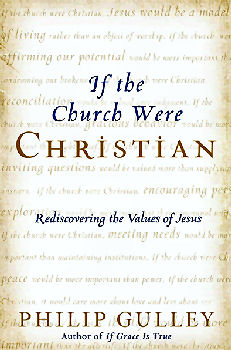
|
Posted October 28, 2010
Book: If the Church Were Christian: Rediscovering the Values of Jesus Author: Philip Gulley Harper One, New York. 2010. pp. 197 An Excerpt from the Jacket:
While the church has dismissed these people as uncommitted and lacking in faith, perhaps the opposite is true. Their commitment to authentic spirituality over institutional idolatry might be the very corrective the church needs. These people respect Jesus, but question what Christianity has become. In If the Church Were Christian, Quaker pastor and author Philip Gulley explores how the church has lost its way. This eye-opening examination of the values of Jesus reveals the extent to which the church has drifted from the teachings of the man who inspired its creation. Many Christians might be surprised to discover how little Jesus had to say about the church, and that he might never have intended to start a new religion. But the church is here to stay, and Gulley is determined to help the church find its soul. If the church were Christian, Gulley argues, affirming our potential would be more important than condemning our brokenness. If the church were Christian, inviting questions would be valued more than supplying answers. If the church were Christian, meeting needs would be more important than maintaining institutions. These simple statements return us to the heart of what Jesus cared about during his ministry. Gulley provides a profound picture of what the church would look like if it refocused on the real priorities of Jesus. An Excerpt from the Book: I know of an inner-city church whose members grew up in the neighborhood, had moved to the suburbs decades before, but returned each Sunday to worship. As the neighborhood around the church changed, the congregation reacted by erecting a fence around their congregants, closing off the one area large enough for neighborhood children to play. No Trespassing signs were posted around the perimeter. A caretaker was hired to watch their grounds and building. Predictably, the church withered, dwindling to a handful of stalwart members, one of whom complained to me, “We can’t seem to attract any new people.” My observation of the many signs of exclusion fell on deaf ears. Not three miles away, another church faced a similar challenge. Crime had skyrocketed in their neighborhood as children and teens went unsupervised and unloved. The church responded with a jobs program, employing fifty children to perform service projects during the summer months. Soon the church was overflowing with young people, and the tenor of the neighborhood was transformed as neighbors began to engage one another. Inspired by members of the church, high-school graduates enrolled in college, becoming teachers, lawyers, and nurses, returning to their community to lend a hand-up to others. To drive past that church building today, one could be forgiven for thinking it was in dire straits --- it appears so timeworn and decrepit. But in the places where the true state of the church is measured, in the hearts of its members, it is vital and life giving. At a critical time, it remembered its call to be light and salt and so transformed the world around it. In turn, it raised a new generation of bold thinkers and leaders who will, I have no doubt, be a positive power for mercy and peace. Would that we all could do the same. Table of Contents: If the Church Were Christian . . . . 1. Jesus would be a model for living rather than an object for worship 2. Affirming out potential would be more important than condemning our brokenness 3. Reconciliation would be valued over judgment 4. Gracious behavior would be more important than right belief 5. Inviting questions would be valued more than supplying answers 6. Encouraging personal exploration would be more important than communal uniformity 7. Meeting needs would be more important than maintaining institutions 8. Peace would be more important than power 9. It would care more about love and less about sex 10. This life would be more important than the afterlife |
|
